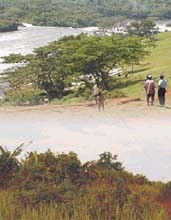|
afrol News, 15 May - A new report shows that the World Bank's Executive Board approved the Ugandan Bujagali dam project "on basis of a distorted economic analysis," the International Rivers Network (IRN) claims. The Bank's management had manipulated data to gain the approval of the project even if the dam was not the cheapest option for generating electricity. Bujagali is a hydropower project on the Victoria Nile in Uganda. Sponsored by the US-based AES Corporation, the 200 MW venture is the largest private power project in Sub-Saharan Africa. The World Bank approved credits and guarantees to the tune of US$ 225 million for Bujagali in December 2001. Analyses of internal documents by International Rivers Network (IRN) show that World Bank management "manipulated data to gain Board approval for the project." A series of other financial institutions, including from the US, UK, Germany and Sweden, have declined support for the project. The World Bank is now planning to extend a further guarantee of US$ 215 million in order to pull some export credit agencies back into the funders' consortium, and so to rescue the dam project. Affected Ugandan citizens filed a complaint against Bujagali with the World Bank's Inspection Panel in July 2001. A report by the Bank's investigative body is pending. - Contrary to Bank management claims, official documents show that the dam is not the cheapest option for generating electricity in Uganda, IRN says in a statement released yesterday. The IRN statement called on the Bank "to reconsider the economics of the project, to allow the World Bank Inspection Panel to submit its near-complete report on Bujagali, and to assess Uganda's promising geothermal potential before taking any further decision on the project."
According to the IRN analysis, the World Bank's appraisal of Bujagali's economic viability contains "major discrepancies with other relevant Bank reports. When presenting the project to the Executive Board, World Bank management neglected, withheld or misrepresented critical information from other Bank documents." Patrick McCully, IRN Campaigns Director, adds that "essential assumptions affecting Bujagali have already proven over-optimistic by developments since the respective documents were published." - Bank management wilfully exaggerated the viability of the dam and downplayed the attractiveness of alternative power sources when presenting the project for Board approval, he says. "There is a serious risk that the Bujagali project will prove an economic white elephant and will add to Uganda's debt burden - at a time when the IMF and IDA have just expressed concern about Uganda's very high debt indicators." Peter Bosshard, author of the IRN report, recommends that before taking any decision on Bujagali, the World Bank's Executive Board should insist that several conditions are met. Firstly, "the potential of geothermal power, which Bank documents indicate is the cheapest power option for Uganda, should be analysed in an unbiased way." Secondly, Bosshard holds the economic viability of Bujagali "should be reconsidered in a more realistic manner, taking into account the recent economic downturn in Uganda." Further, the project's Power Purchase Agreement should be disclosed to the public and "Uganda's civil society should be allowed to have an informed debate about all available options for the country's power sector." Finally, "the World Bank's Board should not take any further decisions on Bujagali until the Bank's Inspection Panel, which has been investigating the project since September 2001, has released its report," Bosshard recommends in his report. IRN's analysis also concludes that the Bujagali project confirmed many findings of the World Commission on Dams (WCD). Published in November 2000, the WCD report noted "that many dams were built not based on an objective assessment and evaluation of the technical, financial and economic criteria", but based on "vested interests". The Bujagali project further documents that the "pervasive appraisal optimism" - which the World Bank had identified as the fundamental source of its portfolio problems in 1992 - still persists today. The AES through its project company AES Nile Power however holds that the Bujagali project site "was selected as it is one of the most environmentally and socially benign hydro options on the Nile." The company emphasises that "Uganda's economy desperately needs electricity" and that the project therefore will be "the only true option Uganda has to meet its core electricity demands." According to information from the World Bank, the Bujagali project will serve the increasing Ugandan electricity demand being "the least cost energy option" - given that the electricity grid would have to be expanded to reach out to uncovered rural areas. Uganda did not possess cheaper energy sources, although wind, solar and geothermal energy could be developed locally, Marc Segal from the Bank last year explained the Ugandan forum of stakeholders.
|
front page
| news
| countries
| archive
| currencies
| news alerts login
| about afrol News
| contact
| advertise
| español
©
afrol News.
Reproducing or buying afrol News' articles.
You can contact us at mail@afrol.com

